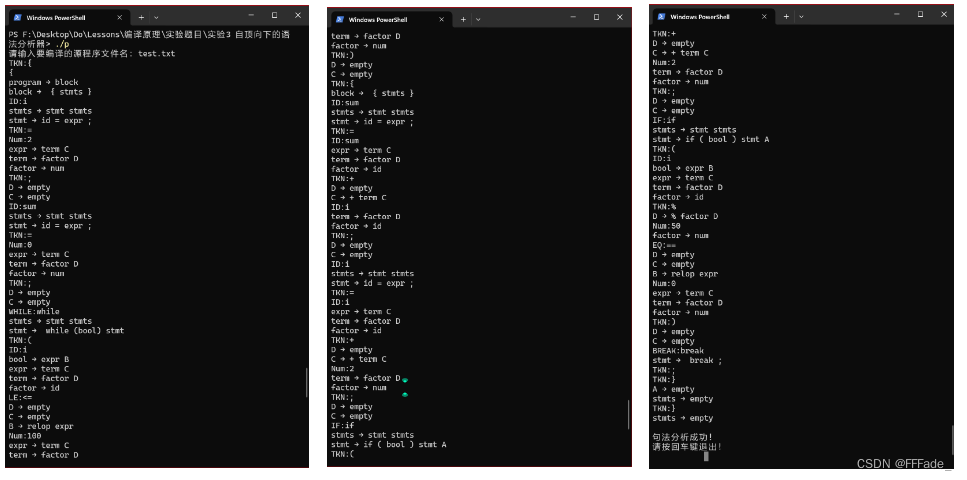自顶向下的语法分析器
一、问题及解决:
- 什么是Dictionary File?

这种类型的文件为Windows虚拟PC 2007,虚拟机,它允许一些版本的Windows在一台计算机上运行生成。它包括像发音和单词的定义以及各种语言,如德国和法国的辞典数据。
-
如何实现语法分析器?
-
词法分析器
- 在 c l a n g . l e x clang.lex clang.lex 增补需要识别的词法单元(do、while、%),并在 l e x . y y . h lex.yy.h lex.yy.h 定义(%需要转义[%%])
- 这里对 ‘%’ 做了简化,按照与 *、/ 同优先级处理,实际优先级:乘除(*/)>取余(%)> 加减(+ -)
-
左递归和公共左因子的处理
- p a r s e r . c p p parser.cpp parser.cpp 初始版本的处理存在左递归和公共左因子,需要改造成 L L ( 1 ) LL(1) LL(1)文法(消除递归可以进一步化简)
-
First集与Follow集
-
注意产生式符合 A − > α B β , β − > ϵ A -> \alpha B \beta,\ \beta->\epsilon A−>αBβ, β−>ϵ 的情况,要将follow(A)加到follow(B)中
C →+ term C | - term C | ɛ
-
-
预测分析器
- 编译
./flex clang.tex /*更新*/ gcc lex.yy.c parser.cpp -o p /*两个文件一起*/- 运行
./flex clang.lex -
if语句二义性的处理
-
对提取左公因子的式子:
stmt → if ( bool ) stmt else_part | 其它语句
else_part → else stmt | ɛ
如果 l o o k a h e a d lookahead lookahead 是词法单元 e l s e else else时,使用产生式 e l s e _ p a r t → e l s e s t m t else\_part→ else stmt else_part→elsestmt;否则使用产生式 e l s e _ p a r t → ϵ else\_part→ \epsilon else_part→ϵ
-
-
二、实验结果:
程序片断:
{
i = 2;
sum = 0;
while (i <=100) {
sum = sum + i;
i = i + 2;
if(i%50==0) break;
}
}
打印产生式如下:

附:
提取公共左因子:
program → block
block →{ stmts }
stmts → stmt stmts | ɛ
stmt →id = expr ;
|if ( bool ) stmt A
|while (bool) stmt
|do stmt while (bool ) ;
|break;
|block
A→else stmt | ɛ
bool → expr B
B → relop expr | ɛ
expr → expr C | term
C → + term | - term
term → term D | factor
D → * factor | / factor | % factor
factor→ ( expr ) | id | num
消除直接左递归:
program → block
block →{ stmts }
stmts → stmt stmts | ɛ
stmt →id = expr ;
|if ( bool ) stmt A
|while (bool) stmt
|do stmt while (bool ) ;
|break;
|block
A→else stmt | ɛ
bool → expr B
B → relop expr | ɛ
expr → term C
C→+ term C | - term C | ɛ
term →factor D
D→* factor D | / factor D| % factor D| ɛ
factor→ ( expr ) | id | num
First集:
first(program) = first(block) = {'{'};
first(stmts) = first{id, if, while, do, break, '{', ɛ};
first(stmt) = {id, if, while, do, break, '{'};
first(A) = {else, ɛ};
first(bool) = first(expr) = first(term) = first(factor) = {'(', id, num};
first(B) = {relop, ɛ};
first(C) = {+, -, ɛ};
first(D) = {*, /, %, ɛ};
Follow集:
follow(program) = {$};
follow(block) = {$, id, if, while, do, break, '{', '}', else};
follow(stmts) = {'}'};
follow(stmt) = {id, if, while, do, break, '{', '}', else};
follow(A) = {id, if, while, do, break, '{', '}', else, '}'};
follow(bool) = {')'};
follow(B) = {')'};
follow(expr) = {relop, ';', ')'};
follow(C) = {relop, ';', ')'};
follow(term) = {+, -, relop, ';', ')'};
follow(D) = {+, -, relop, ';', ')'};
follow(factor) = {+, -, relop, ';', ')', *, /, %};
原文地址:https://blog.csdn.net/qq_38236082/article/details/137741001
免责声明:本站文章内容转载自网络资源,如本站内容侵犯了原著者的合法权益,可联系本站删除。更多内容请关注自学内容网(zxcms.com)!
